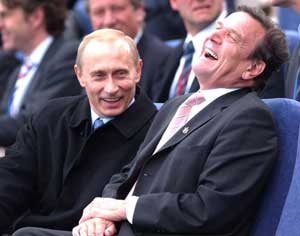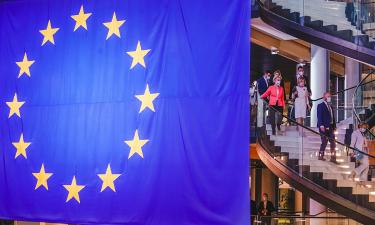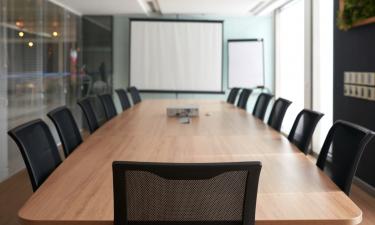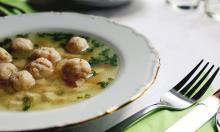Referendum in France to aggravate Russia's relations with EU
France's 'No' to the European Constitution can ruin Putin's 'personal friendship policy' with EU leaders
The relations between Russia and Europe may undergo a serious crisis in the near future. The results of the recent referendum in France, forthcoming early elections in Germany, the problems of the ruling party in Italy may eventually remove the leaders of European states - Jacques Chirac, Gerhard Schroeder, and Silvio Berlusconi - from big politics. It is not ruled out that Putin will have to look for new allies, for the Russian president has been building relations with Europe with the help of his personal friendship with European leaders. 
Russia's recent relations with the countries of the European Union cannot be described as successful. Russia particularly refused to participate in the Council of Europe's top summit in May. The Russian Foreign Minister was representing Russia during the talks, but not the president, which became the first occurrence during Russia's membership in the organization. Russian high-ranking officials said that the head of the Russian Foreign Affairs Ministry would be more appropriate in the discussion, taking into consideration the fact that Brussels was evincing great interest in the notorious Yukos case.
Russia's cooperation with the Parliamentary Assembly of the Council of Europe has been quite problematic recently as well: PACE has been criticizing the Russian government for its actions against Yukos's former CEO, Mikhail Khodorkovsky, too. The OSCE criticizes Moscow's politics in Chechnya while Russia threatens to stop paying membership fees to this organizations in return.
Vladimir Putin's personal friendship policy with European leaders is currently experiencing problems as well. The results of the referendum in France, which turned down the European Constitution, will become an uneasy political test for French President Jacques Chirac. France is to hold the presidential election in 2007, although current requirements to dismiss French Prime Minister Jean-Pierre Raffarin might shake Chirac's political positions as well.
Putin's another friend, German Chancellor Gerhard Schroeder, might lose his position already in autumn of the current year, during the early parliamentary elections in Germany. The political future of another European leader, Italian Prime Minister Silvio Berlusconi, is quite doubtful: Berlusconi's party gives way to the opposition in the parliament of Italy.
Putin started the political friendship with Schroeder and Chirac in February of 2003, when the three leaders criticized the US-led military incursion in Iraq. Western journalists started writing that Paris, Berlin and Moscow had built a special axis in the opposition to the USA. Putin's personal friendship yielded the signing of the agreement about four joint spaces. It is an open secret that Europe's support of Russia is based on the Germany's and France's dependence on Russian energy carriers - natural gas, first and foremost.
Russia's relations with Italy have been virtually based on Putin's friendship with Mr. Berlusconi. The latter repeatedly supported Putin during critical times. When Yukos's CEO, Mikhail Khodorkovsky, was arrested in November of 2003, Silvio Berlusconi stated that everything was happening within the scope of the Russian law, because Vladimir Putin was a very good legal expert.
Italy started buying more natural gas from Russia during Berlusconi's stay at power. Moscow, in its turn, offered certain advantages and preferences for Italian companies working in Russia.
If new leaders appear on Europe's political arena, Russia might face serious problems with the European Union. Most likely, it will be rather difficult for the Russian leadership to establish a new dialogue with new leaders. Such a scenario is possible with Schroeder's likely successor, Angela Merkel, the leader of Germany's Christian Democratic Union.
Such possible political changes in Europe will obviously cause damage to Russia's positions in the EU. Schroeder's and Chirac's support in such notorious issues as the Yukos case, the regulation of the Chechen conflict, the problem of Russia's Kaliningrad enclave, the discrimination of the Russian-speaking minority in Baltic states, has been balancing the anti-Russian criticism from other European countries lately.
On the photo: Vladimir Putin and Gerhard Schroeder
Subscribe to Pravda.Ru Telegram channel, Facebook, RSS!





